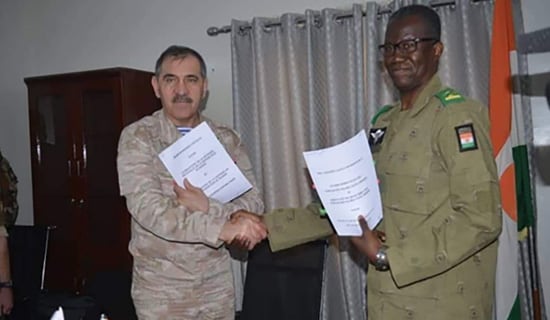Recently, Al-Qa'ida began a biweekly Internet magazine named Al-Ansar: For The Struggle Against the CrusaderWar.[1] The second issue featured an article titled, "Fourth-Generation Wars" by Abu 'Ubeid Al-Qurashi, identifiedby the London Arabic-language daily Al-Quds Al-Arabi as "one of Osama bin Laden's closest aides."[2] In thearticle, Al-Qurashi acknowledges that Al-Qa'ida carried out the September 11 attacks. Following are excerpts fromthe article:
"These days, one is amazed at the extent of the defeatism in morale that has penetrated to the core of the [Islamic] nation. [It even] increases in light of the fact that the first to be afflicted by this ill were some clerics… One of these men spoke on a satellite TV channel about the current American offensive, explaining the shrinking [Arab and Muslim support of] the Mujahideen with a series of false claims. My attention was drawn by his claim that there is an imbalance between the strength of the Mujahideen and that of America and its allies, and that because of this imbalance there is no [point] in Jihad and no need to support [Jihad] because the matter has already been decided in America's favor. These words attest to their speakers' ignorance – first of all, in Islamic religious law, and second, in history and contemporary Western military analyses. This will become clear later [in the article]…"
Al-Qa'ida's Combat Doctrine[3]
"In 1989, some American military experts[4] predicted a fundamental change in the future form of warfare... They predicted that the wars of the 21st century would be dominated by a kind of warfare they called 'the fourth generation of wars.' Others called it 'asymmetric warfare…'"
"Among military historians it is accepted that wars after the Industrial Revolution underwent three main [stages] of development. In the first..., warfare was based on a multitude of soldiers in ranks fighting with primitive rifles. In the second..., between the American Civil War and World War I, warfare was based on exhausting the enemy's economy and damaging as many enemy forces as possible, using intensive gunfire and then, later, [intensive] automatic weapons fire. The third generation of wars saw a comprehensive tactical change, at which the German army excelled during World War II[5]; surrounding the enemy with a formation of tanks and airplanes... from the rear instead of the front lines, [contrary to what] happened in the battles in the trenches of World War I."
"Fourth-generation warfare, the experts said, is a new type of war in which fighting will be
mostly scattered. The battle will not be limited to destroying military targets and regular forces, but will include societies, and will [seek to] destroy popular support for the fighters within the enemy's society. In these wars, the experts stated in their article,[6] 'television news may become a more powerful operational weapon than armored divisions.' They also noted that [in forth-generation wars] 'the distinction between war and peace will be blurred to the vanishing point...'"
"Other Western strategists[7] disagreed with these analyses, claiming that the new warfare would be strategically based on psychological influence and on the minds of the enemy's planners – not only on military means as in the past, but also on the use of all the media and information networks... in order to influence public opinion and, through it, the ruling elite. They claimed that the fourth-generation wars would, tactically, be small-scale, emerging in various regions across the planet against an enemy that, like a ghost, appears and disappears. The focus would be political, social, economic, and military. [It will be] international, national, tribal, and even organizations would participate (even though tactics and technology from previous generations would be used)."
"This new type of war presents significant difficulties for the Western war machine, and it can be expected that [Western] armies will change fundamentally. This forecast did not arise in a vacuum – if only the cowards [among the Muslim clerics] knew that fourth-generation wars have already occurred and that the superiority of the theoretically weaker party has already been proven; in many instances, nation-states have been defeated by stateless nations."
Victories by the Islamic Nation
"...[T]he Islamic nation has chalked up the most victories in a short time, in a way it has not known since the rise of the Ottoman Empire. These victories were achieved during the past twenty years, against the best armed, best trained, and most experienced armies in the world (the U.S.S.R. in Afghanistan, the U.S. in Somalia, Russia in Chechnya, and the Zionist entity in southern Lebanon) and in various arenas (mountains, deserts, hills, cities). In Afghanistan, the Mujahideen triumphed over the world's second most qualitative power at that time… Similarly, a single Somali tribe humiliated America and compelled it to remove its forces from Somalia. A short time later, the Chechen Mujahideen humiliated and defeated the Russian bear. After that, the Lebanese resistance [Hizbullah] expelled the Zionist army from southern Lebanon."
"It is true that all the victories of the past did not lead to the establishment of the winners' regime. But this is not the topic of our study. This article is aimed at investigating the purely military confrontation, due to claims regarding the imbalance between America and the Mujahideen – which makes, according to the defeatists, Jihad and victory impossible."
"Technology did not help these great armies, even though [this technology] is sufficient to destroy the planet hundreds of times over using the arsenal of nuclear, chemical, and biological weapons. The Mujahideen proved their superiority in fourth-generation warfare using only light weaponry. They are part of the people, and hide amongst the multitudes... Thus, Michael Pickers said,[8] 'Many of our means are unsuited to this type of warfare.'"
"Also with regard to the order of battle, there is much to say… [Al-Qurashi expands upon the numerical inferiority of Islamic forces in Afghanistan, Chechnya, and Somalia]. Thus, it appears that there are precedents for world powers and large countries being defeated by [small] units of Mujahideen over the past two decades, despite the great difference between the two sides. Therefore, the doubts cast by this coward [cleric] are shattered."
SUPPORT OUR WORK

Taking Credit for September 11
"Some may object [to this analysis], claiming that all those wars involved encounters between homogenous nations and invading armies – and therefore they cannot serve as examples for Al-Qa'ida, which fights outside its land, sometimes in a hostile environment."
"I will respond to this counter-claim: First of all, Al-Qa'ida fights alongside the Taliban, who are locals. Second, Al-Qa'ida's Mujahideen have proven from the outset that they rise above the traditional [internal] conflicts…"
"Al-Qa'ida takes pride in that, on September 11, it destroyed the elements of America's strategic defense, which the former U.S.S.R. and every other hostile state could not harm. These elements are: early warning, preventive strike, and the principle of deterrence.[9]"
"Early warning: With the September 11 attacks, Al-Qa'ida entered the annals of successful surprise attacks, which are few in history – for example, the Japanese attack on Pearl Harbor in 1941, the surprise Nazi attack on the U.S.S.R. in 1941, the Soviet invasion of Czechoslovakia in 1968, and the crossing of the Zionist Bar-Lev Line in 1973. Moreover: In the pain it caused, [Al-Qa'ida] surpassed these surprise attacks, because it put every individual in American society on [constant] alert for every possibility, whether emotionally or practically. This has an extremely high economic and psychological price, particularly in a society that has not been affected by war since the American Civil War. If the USS Cole incident could happen to the American army, which is assumed to be in perfect preparedness, then preparing an entire society for 'terrorist' attacks appears hard to achieve."
"Preventive strike: This element was also shaken on September 11. This element is subordinate to the first… Even assuming that there had been early warning, it is very difficult to launch a successful preventive strike at an organization that maneuvers and moves quickly, and has no permanent bases."
"Deterrence: This principle is based on the assumption that there are two sides [fighting] that seek to survive and defend their interests – but it is completely eliminated when dealing with people who don't care about living but thirst for martyrdom. While the principle of deterrence works well [in warfare] between countries, it does not work at all for an organization with no permanent bases and with no capital in Western banks, that does not rely on aid from particular countries. As a result, it is completely independent in its decisions, and it seeks conflict from the outset. How can such people, who strive for death more than anything else, be deterred?"
"In addition to the destruction of these three elements, Al-Qa'ida has dealt Americans the most severe blow ever to their morale: One of the Western strategies[10] determined that the best means of bringing about a psychological defeat is to attack a place where the enemy feels safe and secure. This is exactly what the Mujahideen did in New York."
"It appears, therefore, that the imbalance between America and the Mujahideen, of which the cowards [clerics] speak, is exactly what is needed to confront the Western military machine, particularly the American [machine]. [America] is baffled by fourth-generation warfare that suits Jihad avant-garde – especially at a time when the Islamic peoples have re-espoused Jihad, after they had nothing left to lose because of the humiliation that is their daily lot."
"The Americans and the West comprehend the nature of the new challenge, and acknowledge the difficulty of the task ahead of them..."
"The time has come for the Islamic movements facing a general crusader offensive to internalize the rules of fourth-generation warfare. They must consolidate appropriate strategic thought, and make appropriate military preparations. They must increase interest in Da'wa [proselytizing], and recruit the peoples' public and political support. In addition to the religious obligation, this has become an integral part of the means to triumph in fourth-generation warfare. Old strategists, such as [von] Clausewitz and Mao Zedong, have already indicated this. Perhaps the best example is the phenomenon of the intifada, that wiped out the Zionist military's mighty superiority over the Muslim Palestinian people."
"...America wants to use military action to shatter the Mujahideen's great psychological achievements, and the resonance and positive ramifications of [their] acts of heroism that draw support and sympathy in the Islamic world."
"We pray to Allah to silence the cowards' crow-like calls, and to bring forth for this [Islamic] nation a new generation of preachers and clerics, who can meet the challenges posed by fourth-generation warfare."
[1] www.geocities.com/al_anssar/index.html.
[2] Al-Quds Al-Arabi (London), February 9, 2002.
[3] All subheadings added by the translator.
[4] William S. Lind, Col. Keith Nightenagle (USA), Captain John F. Schmitt (USMC), Col. Joseph W. Sutton (USA), and Lt.-Col. Gary I Wilson (USMCR), "The Changing Face of War: Into the Fourth Generation," Marine Corps Gazette October 1989 (source from original article in Arabic).
[7] Lt.-Col. Thomas X. Hammes, "The Evolution of War: The Fourth Generation," Marine Corps Gazette, September 1994 (source from original article in Arabic).
[8] Center for Strategic and Budgetary Assessments, Washington, D.C. This quote is translated from the Arabic, and is not the original English.
[9] Steven Simpson and Daniel Benjamin, "The Terror," Survival, Vol. 43 No. 4, January 2002 (source from original article in Arabic) Note that this article was published recently.
[10] Vincent J. Goulding Jr., "Back to the Future with Asymmetric Warfare," Parameters, Winter 2000-2001 (source from original article in Arabic).




